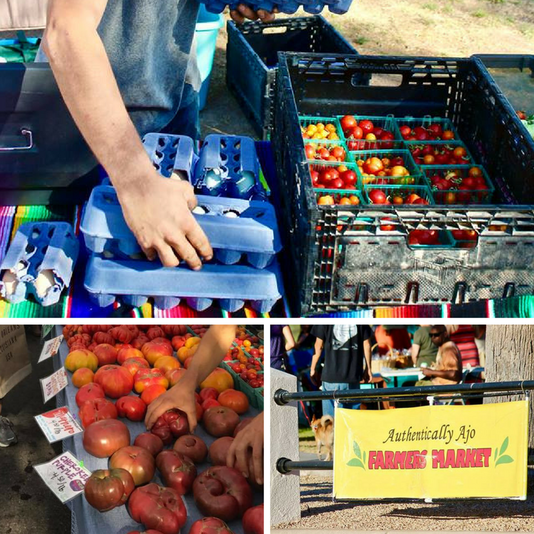MARKET SPOTLIGHT: ARIZONA MARKET PROMOTES SUSTAINABILITY AS A CHAMPION FOR THE ENVIRONMENT
Over the last few months, we've been highlighting some of Arizona's incredible farmers markets and organizations as part of the American Farmland Trust's Farmers Market Celebration. We've celebrated markets that go above and beyond in supporting family farmers, bringing healthy food to all, and acting as pillars of their communities.
The final pillar of the celebration focuses on how farmers markets can be champions for the environment. One such organization in Arizona who promotes sustainability in everything they do, is the Ajo Center for Sustainable Agriculture (CSA), a community-based nonprofit dedicated to developing a sustainable and just food system in Ajo, Arizona. Their team also runs the Authentically Ajo Farmers Market, bringing fresh produce to their community every week.
Nina Sajovec, Executive Director at the Authentically Ajo Farmers Market, explained that the Ajo CSA and farmers market practice sustainable agriculture in all aspects, from eco-friendly farming practices to reducing food waste.
The CSA uses sustainable soil building practices, including on-site composting and using animals and cover crops for soil production. By focusing on growing drought resistant and alkaline-tolerant crops that are native to this area (or adapted to these conditions) the organization ensures their crops are sustainable and fruitful year-round.
“We offer community education focusing on how local food choices reduce your carbon foot print, reduce trucking and storage expenses and foot prints, reduce plastic bags, and reduce food waste in general,” Nina said.
The center also provides training for growers, emphasizing how sustainable agriculture practices lead to better food safety, and better products.
The Authentically Ajo Farmers Market follows these themes and more each week. All growers at the market use sustainable practices, and they encourage customers to buy locally and in season.
“We encourage people to bring their own bags and totes, and we sell fabric totes as well,” Nina said. “Growers limit the use of plastic bags for pre-packaging, and encourage customers to bring their own, as well as process and store their produce right after purchase.”
The market also partners with other organizations in town to promote biking to the market, and they organize at least two events per year to spread awareness and reward sustainable practices. Food left over after the market is either distributed to volunteers and other vendors, or delivered to the Ajo Food Pantry and/or families in need to make sure there is zero food waste.
“Our market became one of the most visible aspects of the sustainable local food system we are building in Ajo, and we believe it is crucial to understand and promote it,” Nina said. “Our newsletters focus on native crops and seasonality, and we share recipes on how to use these perhaps unfamiliar crops every week.”
All of these incredible, sustainable efforts are certainly worth recognizing. This fall, ask the volunteers, growers or managers at your local farmers market how they are champions for the environment and help share their stories of success.
This blog brings the conclusion of American Farmland Trust's Farmers Market Celebration coverage for this year. We hope it helped raise awareness about the importance of farmers markets, market managers, farmers and the communities they serve! Visit your favorite farmers market this fall to support your local farmers, double up on fresh produce, and connect with your community.
“We can choose food that doesn't lead to illnesses like diabetes and cancer. We can choose food that doesn't contribute to water pollution and climate change. And we can choose food that keeps local economies vibrant and farmers on their land.”
-- Frances Beinecke

